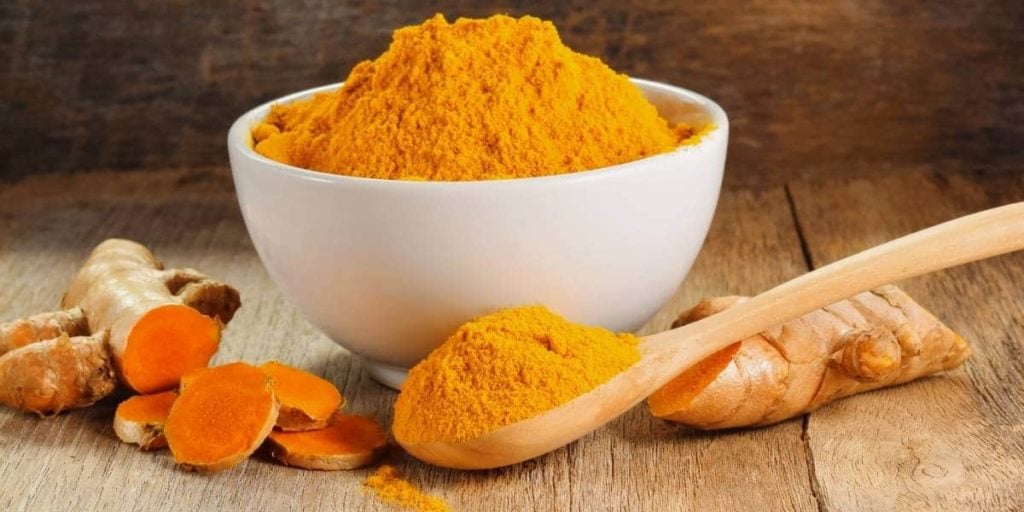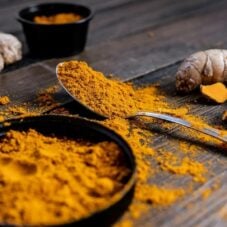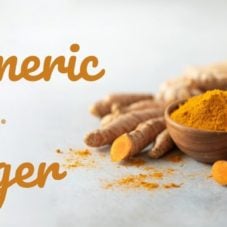Vitality
10 Meriva Curcumin Phytosome Benefits You Need to Know About
For centuries, turmeric has been a trusted remedy for common ailments. From coughs and colds to stomach troubles and insect bites, turmeric has been the go-to herb. Its secret? Curcumin, turmeric’s main component, known for its powerful healing properties.
The only problem is that curcumin is poorly absorbed by the body, making traditional turmeric supplements less effective. That’s where Curcumin Phytosome comes in. It enhances absorption, allowing you to enjoy the full range of curcumin’s health benefits.
Table of Contents
What’s Meriva? And What’s Curcumin Phytosome? Are They The Same Thing?
Meriva is a patented curcumin delivery system developed by the Italian biotech company, Indena. It’s designed to improve curcumin’s bioavailability, or how well it’s absorbed by the body.
In regular supplements, curcumin is simply packed into capsules or tablets. This method doesn’t improve absorption, so most curcumin isn’t used by the body and is wasted. Meriva changes this by binding curcumin to phosphatidylcholine, a compound found in cell membranes. This combination, called curcumin phytosome, makes it easier for the body to absorb.
Studies show that Meriva curcumin is absorbed up to 2900% better than regular curcumin!1 Without this enhanced delivery system, most curcumin supplements are ineffective. That’s why Meriva is considered the superior choice for getting the most out of curcumin.
If you want to know more about Meriva, we published an ultimate guide to Meriva Curcumin here, so do check it out as well!
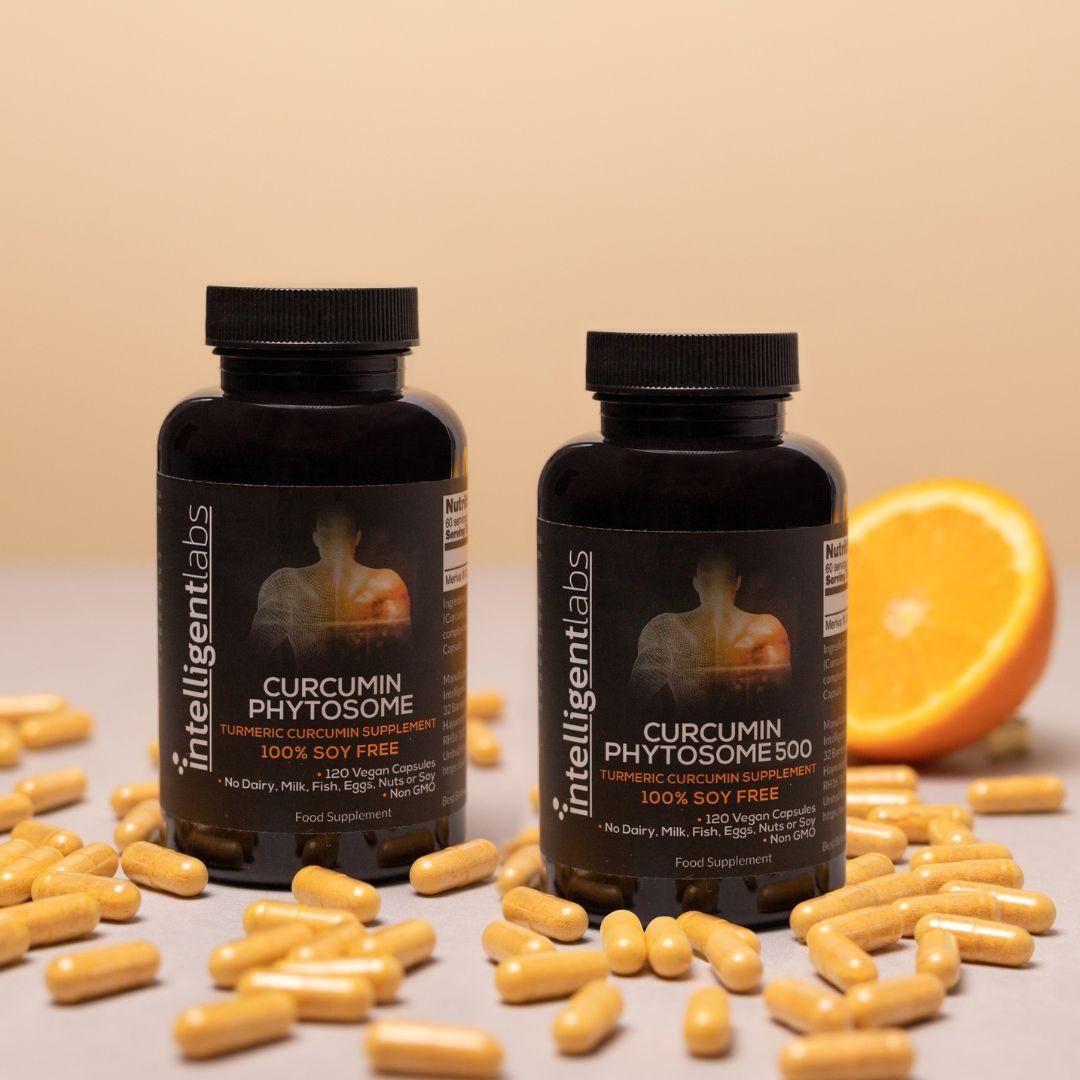
How Meriva Curcumin Phytosome Can Help Improve Your Quality of Life
Taking Meriva curcumin lets you unlock curcumin’s incredible benefits. Here are the top ten:
1) Curcumin fights free radicals as a potent antioxidant
Free radicals are unstable molecules produced during metabolism and immune responses. Left unchecked, they cause oxidative stress, damaging cells, proteins, and even DNA, which can lead to health issues.
Antioxidants neutralize free radicals. Curcumin joins the ranks of powerful antioxidants like glutathione and vitamins A, C, and E. If your diet lacks antioxidants, curcumin supplementation can help.
A 6-week study showed that patients who supplemented with curcumin enjoyed higher antioxidant levels in their blood plasma.2 As for the dosage, 500mg per day is enough to see significant changes in plasma antioxidants.3
2) Curcumin reduces chronic inflammation
Inflammation protects the body from injury and infection, but chronic inflammation leads to serious diseases like arthritis, type 2 diabetes, and heart disease.4
Curcumin is a natural anti-inflammatory that fights chronic inflammation effectively. Users of our Intelligent Labs’ Curcumin Phytosome supplements report reduced symptoms. This aligns with a study where osteoarthritis patients experienced less pain, reduced inflammation markers, and improved mobility after taking Meriva curcumin phytosome.5
3) Curcumin boosts mood and memory
Curcumin helps increase serotonin and dopamine, improving mood and relieving depression.6
A 2018 study found that taking 90 mg of curcumin twice daily improved memory and attention in middle-aged and older adults. Brain scans revealed reduced amyloid and tau accumulation, which are linked to cognitive decline.7
Other research also highlights curcumin’s ability to lower anxiety and depression episodes with doses of at least 250 mg daily over four months.8
4) Curcumin phytosome supports healthy brain function
Dementia rarely presents in younger people, but it does happen. Amongst the elderly, however, dementia is a lot more common, with Alzheimer’s being the most common form. Chronic inflammation is also said to be one of the root causes of Alzheimer’s.4
As a natural anti-inflammatory, curcumin may also help patients with dementia and cognitive decline. A Japanese study observed significant improvements in Alzheimer’s patients who took 764 mg of turmeric powder daily (equivalent to about 100mg of curcumin) for three months. Symptoms like anxiety, agitation, and urinary incontinence reduced, and after a year, patients were living more peacefully.9
5) Lowers risk of cardiovascular disease
Did you know heart disease and stroke are two of the world’s top killers? According to the World Health Organization, millions of people die from these 2 diseases each year.
While not a cure-all, curcumin reduces key risk factors for cardiovascular disease. A 2020 review found that curcumin phytosome reduced atherosclerosis indicators like serum lipids and inflammatory markers.10
Additionally, coronary bypass patients in Thailand who took 4g of curcumin daily had lower risks of heart attacks and reduced inflammation compared to a placebo group.11
6) Helps prevent and manage Type 2 Diabetes symptoms
A high-calorie diet loaded with sugar and processed foods can lead to weight gain, increasing the risk of type 2 diabetes. Fortunately, curcumin phytosome may help prevent it.
In a study on pre-diabetics, 240 participants took either curcumin or a placebo for nine months. Not a single person in the curcumin group developed diabetes, while 16% of the placebo group did. Curcumin also improved beta cell function (these are the cells that make insulin), reduced weight, and trimmed waistlines.5
In type 2 diabetics, curcumin improved insulin sensitivity, lowered triglycerides, reduced fat, and slimmed waistlines—factors that reduce heart disease risk.12
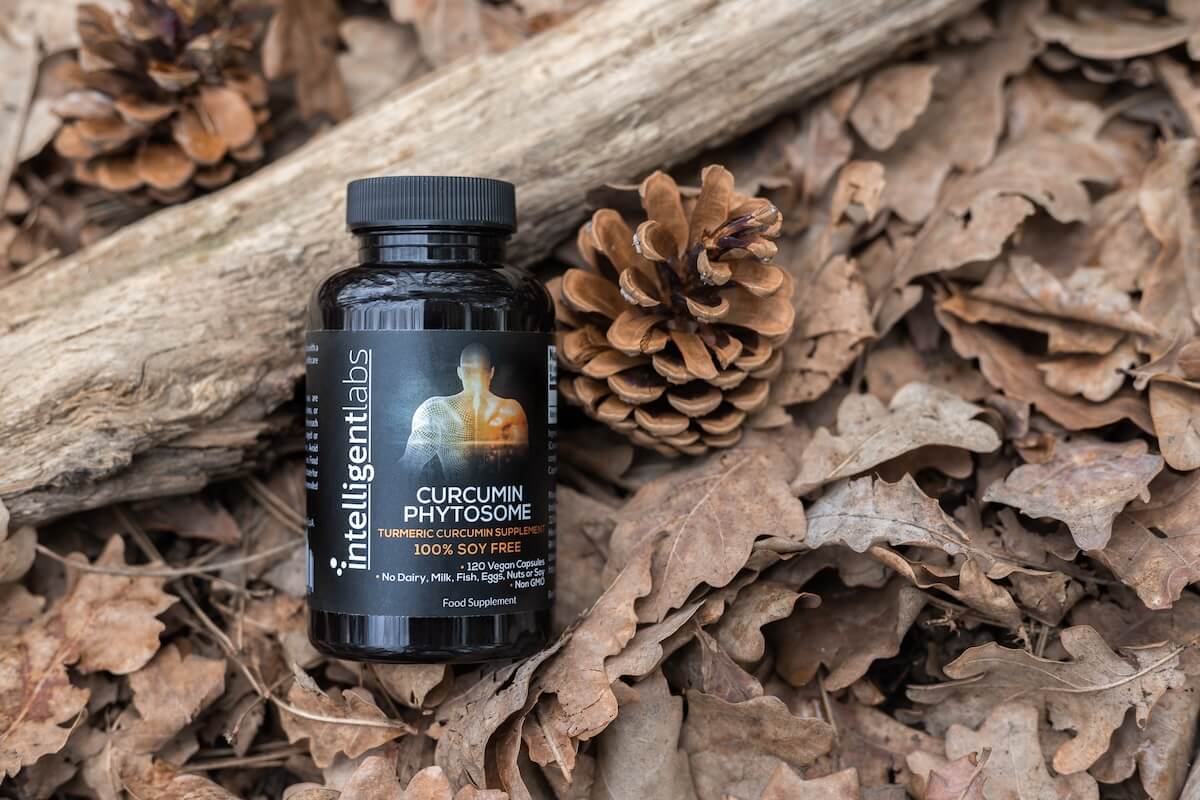
7) Slows down aging
Curcumin’s antioxidant properties help fight free radicals, which accelerate aging. These harmful molecules come from both internal processes (e.g., metabolism) and external sources like UV rays, pollution, and stress.13
While aging is inevitable, curcumin can help slow its effects and protect against premature signs of aging.
8) Curcumin phytosome relieves pain naturally
Curcumin is a powerful natural analgesic. It reduces pain and stiffness in osteoarthritis patients, and studies show it’s comparable to 1g of acetaminophen when taking 2g of Meriva (400mg curcumin) daily.14
Unlike acetaminophen, which can harm the liver and kidneys if overused, curcumin is safe at doses up to 12g per day with minimal risk of toxicity.15
9) Improves vision and eye health
Curcumin may protect and restore vision. In a study, patients with central serous chorioretinopathy (a condition causing vision loss) took 1.2g of Meriva (240mg curcumin) daily for 12 months. Most patients saw significant improvements.16
A 2019 review highlighted curcumin’s potential for treating major eye diseases, including glaucoma, cataracts, macular degeneration, and dry eye disease.17
10) Fights various types of cancer
Animal studies show that curcumin can slow cancer cell growth, shrink tumors, and limit progression.18 This is really promising and exciting news for us humans! While clinical trials are ongoing, early results are promising.19 The good thing is that curcumin is affordable, easily available, and has no significant side effects.
Additionally, curcumin may enhance cancer therapy by reducing chemotherapy and radiotherapy side effects. Survival rates were also higher among cancer patients taking curcumin compared to a placebo.20
Conclusion
Adding curcumin phytosome to your routine can benefit your overall health. Try our 250mg Meriva Curcumin Phytosome or opt for the 500mg variant if you prefer a higher dose. Let us know how it works for you!
💬 Something on your mind? Share your thoughts in the comments. We love hearing from curious minds.
📩 And while you’re here, join our newsletter for more smart stuff (and secret perks)!
References:
- Belcaro, Gianni et al. “Efficacy and safety of Meriva®, a curcumin-phosphatidylcholine complex, during extended administration in osteoarthritis patients.” Alternative medicine review : a journal of clinical therapeutic vol. 15,4 (2010): 337-44. ↩︎
- Sahebkar A., Serbanc M.C., Ursoniuc S., Banach M. Effect of curcuminoids on oxidative stress: A systematic review and meta-analysis of randomized controlled trials. J. Funct. Foods. 2015;18:898–909. doi: 10.1016/j.jff.2015.01.005. ↩︎
- Pungcharoenkul, Kanit, and Phensri Thongnopnua. “Effect of different curcuminoid supplement dosages on total in vivo antioxidant capacity and cholesterol levels of healthy human subjects.” Phytotherapy research : PTR vol. 25,11 (2011): 1721-6. doi:10.1002/ptr.3608 ↩︎
- Pahwa R, Goyal A, Bansal P, et al. Chronic Inflammation. [Updated 2020 Aug 10]. In: StatPearls [Internet]. Treasure Island (FL): StatPearls Publishing; 2020 Jan-. Available from: https://www.ncbi.nlm.nih.gov/books/NBK493173/ ↩︎
- Chuengsamarn, Somlak et al. “Curcumin extract for prevention of type 2 diabetes.” Diabetes care vol. 35,11 (2012): 2121-7. doi:10.2337/dc12-0116 ↩︎
- Kulkarni, Shrinivas K et al. “Antidepressant activity of curcumin: involvement of serotonin and dopamine system.” Psychopharmacology vol. 201,3 (2008): 435-42. doi:10.1007/s00213-008-1300-y ↩︎
- Small, Gary W et al. “Memory and Brain Amyloid and Tau Effects of a Bioavailable Form of Curcumin in Non-Demented Adults: A Double-Blind, Placebo-Controlled 18-Month Trial.” The American journal of geriatric psychiatry : official journal of the American Association for Geriatric Psychiatry vol. 26,3 (2018): 266-277. doi:10.1016/j.jagp.2017.10.010 ↩︎
- Lopresti, Adrian L, and Peter D Drummond. “Efficacy of curcumin, and a saffron/curcumin combination for the treatment of major depression: A randomised, double-blind, placebo-controlled study.” Journal of affective disorders vol. 207 (2017): 188-196. doi:10.1016/j.jad.2016.09.047 ↩︎
- Hishikawa, Nozomi et al. “Effects of turmeric on Alzheimer’s disease with behavioral and psychological symptoms of dementia.” Ayu vol. 33,4 (2012): 499-504. doi:10.4103/0974-8520.110524 ↩︎
- Lin, Ke et al. “Efficacy of Curcumin on Aortic Atherosclerosis: A Systematic Review and Meta-Analysis in Mouse Studies and Insights into Possible Mechanisms.” Oxidative medicine and cellular longevity vol. 2020 1520747. 9 Jan. 2020, doi:10.1155/2020/1520747 ↩︎
- Wongcharoen, Wanwarang et al. “Effects of curcuminoids on frequency of acute myocardial infarction after coronary artery bypass grafting.” The American journal of cardiology vol. 110,1 (2012): 40-4. doi:10.1016/j.amjcard.2012.02.043 ↩︎
- Chuengsamarn, Somlak et al. “Reduction of atherogenic risk in patients with type 2 diabetes by curcuminoid extract: a randomized controlled trial.” The Journal of nutritional biochemistry vol. 25,2 (2014): 144-50. doi:10.1016/j.jnutbio.2013.09.013 ↩︎
- Poljšak, Borut, and Raja Dahmane. “Free radicals and extrinsic skin aging.” Dermatology research and practice vol. 2012 (2012): 135206. doi:10.1155/2012/135206 ↩︎
- Di Pierro, Francesco et al. “Comparative evaluation of the pain-relieving properties of a lecithinized formulation of curcumin (Meriva(®)), nimesulide, and acetaminophen.” Journal of pain research vol. 6 (2013): 201-5. doi:10.2147/JPR.S42184 ↩︎
- Lao, Christopher D et al. “Dose escalation of a curcuminoid formulation.” BMC complementary and alternative medicine vol. 6 10. 17 Mar. 2006, doi:10.1186/1472-6882-6-10 ↩︎
- Mazzolani, Fabio, and Stefano Togni. “Oral administration of a curcumin-phospholipid delivery system for the treatment of central serous chorioretinopathy: a 12-month follow-up study.” Clinical ophthalmology (Auckland, N.Z.) vol. 7 (2013): 939-45. doi:10.2147/OPTH.S45820 ↩︎
- Radomska-Leśniewska, Dorota M et al. “Therapeutic potential of curcumin in eye diseases.” Central-European journal of immunology vol. 44,2 (2019): 181-189. doi:10.5114/ceji.2019.87070 ↩︎
- Panda, Abir Kumar et al. “New insights into therapeutic activity and anticancer properties of curcumin.” Journal of experimental pharmacology vol. 9 31-45. 31 Mar. 2017, doi:10.2147/JEP.S70568 ↩︎
- Willenbacher, Ella et al. “Curcumin: New Insights into an Ancient Ingredient against Cancer.” Int’l journal of molecular sciences vol. 20,8 1808. 12 Apr. 2019, doi:10.3390/ijms20081808 ↩︎
- Mansouri, Kamran et al. “Clinical effects of curcumin in enhancing cancer therapy: A systematic review.” BMC cancer vol. 20,1 791. 24 Aug. 2020, doi:10.1186/s12885-020-07256-8 ↩︎

